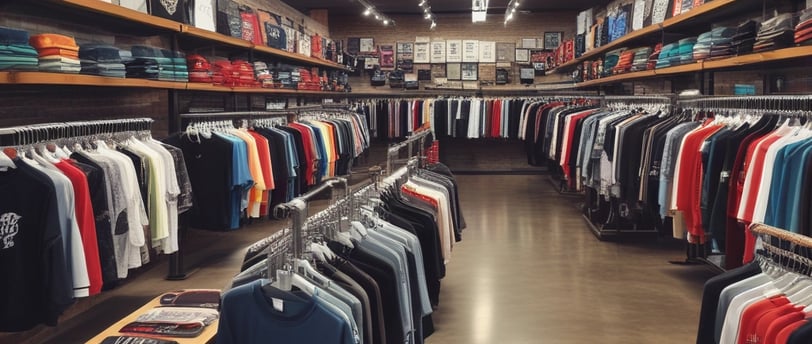Embrace Customization and Personalization to Enhance Merchandise Appeal
5/5/20255 min read


The Importance of Customization in Merchandise
In today's highly competitive market, customization plays a pivotal role in enhancing the appeal of merchandise. Customer expectations have evolved significantly, with modern consumers increasingly seeking personalized products that resonate with their individual preferences, values, and identities. This shift towards customization reflects a broader trend where buyers not only desire products but also experiences that are tailored specifically to them.
Research has shown that approximately 70% of consumers express a strong preference for personalized experiences when making purchases. This aligns with psychological principles indicating that personalized products create a sense of ownership and emotional attachment in consumers. When buyers feel that a product is uniquely made for them, it fosters brand loyalty and increases the likelihood of repeat purchases. For businesses, catering to the demand for customization can lead to higher customer satisfaction rates and a more robust connection with the target audience.
Moreover, the advent of advanced technology has made it easier for businesses to implement customization options in their merchandise. From online configurators allowing customers to design their own products to leveraging data analytics to understand individual consumer preferences, companies are now well-equipped to offer personalized solutions at scale. This not only enhances the shopping experience but also differentiates brands in a crowded marketplace, driving competitive advantage.
To capitalize on this growing trend, businesses must actively engage with their customers to understand their needs and preferences. By incorporating feedback and utilizing data-driven insights, companies can refine their merchandise offerings to include customizable options. Ultimately, embracing customization no longer stands as just an added feature but as a crucial strategy to increase merchandise appeal and foster deeper relationships with consumers.
Ways to Offer Customization Options
In today's competitive marketplace, offering customization options is imperative for businesses seeking to enhance the appeal of their merchandise. Providing customers with the ability to personalize products not only fosters a sense of ownership but also strengthens their emotional connection to the brand. There are several effective methods and tools that can facilitate this customization process, allowing for a unique customer experience.
One prevalent approach is enabling customers to select colors for their merchandise. For instance, apparel brands often provide a range of color palettes for customers to choose from, allowing them to tailor their garments to their personal tastes. This basic form of customization can be expanded to include multiple fabric options, which can be particularly appealing for bespoke items.
In addition to color selection, offering the option to add names or initials is another way to enhance product personalization. Personalized items such as monogrammed bags or customized jewelry can significantly increase a product’s perceived value. Implementing straightforward online forms that allow customers to input their desired text can streamline this process, ensuring it is both user-friendly and efficient.
Furthermore, advances in technology have enabled more complex forms of customization. Online platforms equipped with design tools allow customers to create unique designs. For example, print-on-demand services provide users with the ability to upload their images or artwork directly onto products. This not only offers a canvas for creativity but also minimizes inventory risks for businesses by only producing items that have already been purchased.
Incorporating high-quality printing technology also plays a crucial role. Businesses can utilize digital printing, embroidery, or heat transfer techniques to ensure that the customized designs are durable and visually appealing. By investing in suitable technology and user-friendly online customization tools, businesses can enhance the overall personalization experience and significantly increase merchandise appeal.
Benefits of Personalization for Businesses
In recent years, personalization has emerged as a pivotal strategy for businesses seeking to enhance their merchandise appeal. The implementation of personalized merchandise can lead to increased customer satisfaction, as consumers increasingly favor products that resonate with their individual preferences and identity. When customers feel that their unique needs are being met, it fosters a sense of connection to the brand, subsequently boosting their overall satisfaction. This level of engagement not only heightens the shopping experience but also cultivates long-term customer relationships.
Another significant benefit of offering personalized merchandise is the enhancement of brand loyalty. Customers who receive customized products are more likely to develop a commitment to the brand, as the personalized experience creates a deeper emotional bond. This loyalty translates into repeat purchases and the likelihood of choosing the same brand over competitors. Consequently, this loyalty becomes a leverage point for businesses to differentiate themselves in a saturated market.
Furthermore, personalization establishes a unique selling proposition that sets a business apart from others. In an environment where standardization is prevalent, having a customized approach makes a brand memorable. This distinctiveness can attract new customers, as individuals often gravitate towards brands that offer tailored experiences that cater specifically to their desires.
Increased sales potential is yet another advantage of personalization. Tailored marketing strategies and merchandise can lead to upselling opportunities, as personalized options often appeal to consumer willingness to spend more on products that meet their specific needs. The positive ripple effect of personalized merchandise also extends to enhanced customer engagement and word-of-mouth referrals, which can drive additional traffic to the business. Overall, embracing personalization is not merely a trend; it is a strategic necessity for businesses aiming for sustained growth in today’s competitive landscape.
Case Studies of Successful Brand Implementations
Many brands have effectively utilized customization and personalization strategies to enhance their merchandise appeal. These case studies provide valuable insights into the practices that can lead to increased customer engagement, higher sales, and improved brand loyalty.
One notable example is Nike with its "Nike By You" program. This initiative allows customers to customize their footwear by choosing colors, materials, and even personal inscriptions. Nike reported a significant increase in online sales after launching this program, illustrating the demand for personalized products. The ability to design their own shoes led to a deeper emotional connection to the brand, resulting in not only an uptick in sales but also enhanced customer satisfaction and loyalty.
Another successful case is Coca-Cola’s "Share a Coke" campaign, which involved replacing its iconic logo with popular names. This simple yet effective strategy created a buzz and encouraged customers to seek out bottles bearing their names or the names of loved ones. The campaign garnered widespread social media attention and prompted customers to share their experiences online, enhancing the overall brand image. As a result, Coca-Cola experienced a notable increase in sales volume, demonstrating the effectiveness of personalization as a marketing strategy.
Furthermore, the cosmetics brand Glossier has made waves in the beauty industry by harnessing user-generated content and feedback to tailor its product offerings. The brand actively engages with its community through social media, utilizing customer insights to refine its products and create limited-edition offerings based on popular demand. This practice not only strengthens customer relationships but also positions Glossier as an adaptive and responsive brand, driving sales and fostering long-term loyalty.
These case studies reflect the substantial impact of personalization and customization on brand success. By adopting similar practices, other businesses can enhance their merchandise appeal, cultivate customer loyalty, and ultimately drive increased sales and positive brand reputation.
